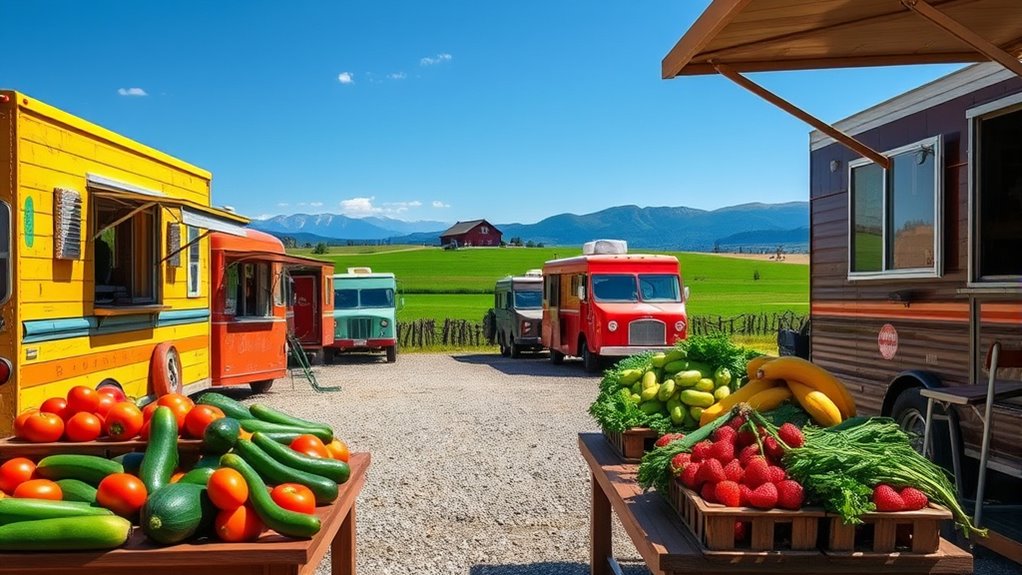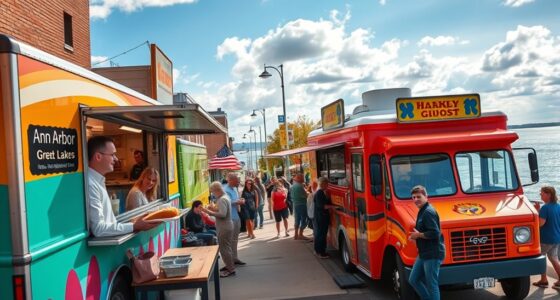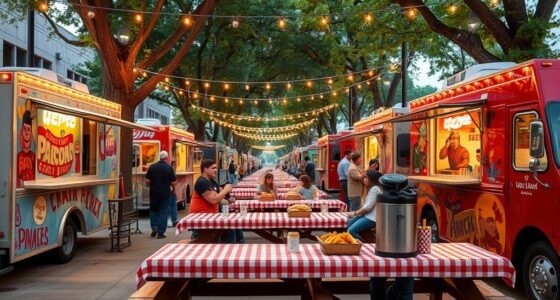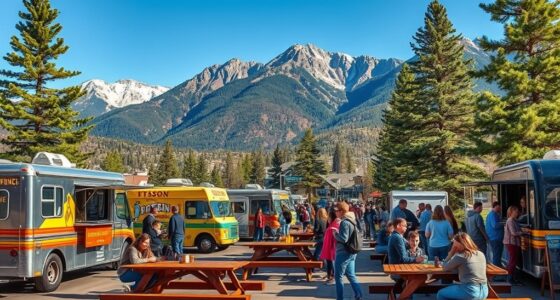Exploring farm-fresh and rustic food trucks in Coeur d’Alene means experiencing locally sourced ingredients and seasonal flavors reflected in menus that change throughout the year. These trucks often use traditional cooking methods like open flames, cast-iron pots, and slow roasting, adding authentic regional flair. Many partner with local breweries and offer diverse global influences. Keep exploring to discover how these trucks blend community, tradition, and fresh ingredients into a vibrant food scene you won’t forget.
Key Takeaways
- Coeur d’Alene food trucks prioritize local, seasonal ingredients, reflecting regional terroir and supporting nearby farms.
- Many trucks use rustic cooking techniques like open flames, wood fires, and cast-iron pots for authentic flavors.
- The community scene includes permanent and mobile trucks partnering with local breweries and hosting events.
- Diverse cuisines, including Mexican, BBQ, and fusion styles, incorporate regional ingredients and rustic cooking methods.
- Regulations and operational costs present growth opportunities while requiring careful compliance for farm-fresh, rustic offerings.
Embracing Local Sourcing and Seasonal Flavors
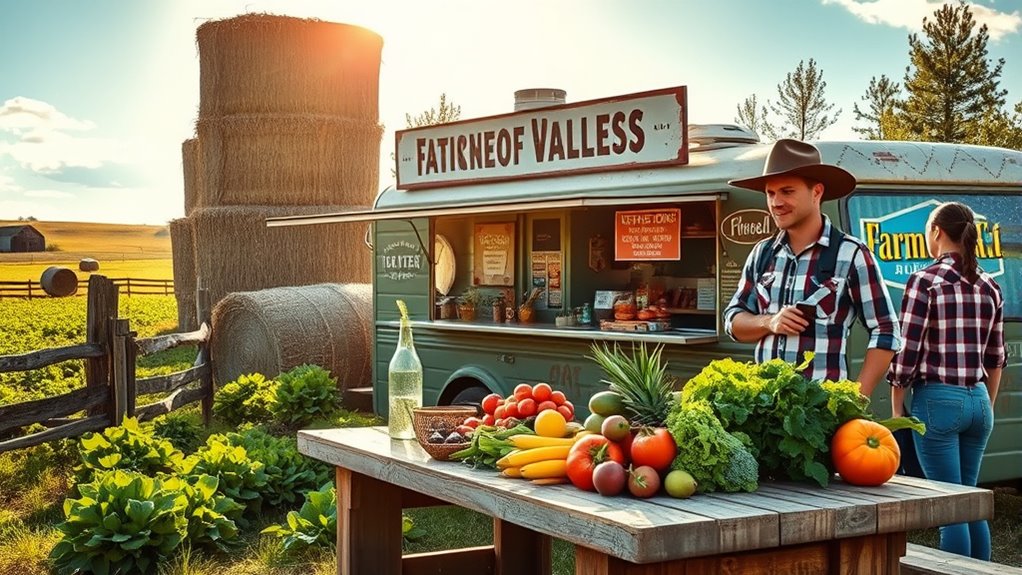
In Coeur d’Alene, food trucks actively embrace local sourcing and seasonal flavors to create fresh, flavorful dishes. You’ll notice many prioritize ingredients from nearby vendors, ensuring each bite is as fresh as possible. They adapt menus throughout the year, incorporating seasonal produce like spring greens, berries, fall squashes, and root vegetables, which enhances taste and reduces food miles. Places like Cascadia Pizza Co. highlight Northwest-sourced ingredients, reflecting regional terroir. Food trucks at spots like Best Ave Food Truck Court serve dishes that emphasize local, seasonal items, fostering community ties and sustainability. By partnering with nearby farmers and producers, these trucks support regional agriculture while offering authentic, ever-changing flavors that keep your dining experience exciting and connected to the local landscape. Recognizing the importance of seasonal eating, these trucks contribute to both environmental sustainability and regional identity.
Rustic Cooking Techniques and Authentic Flavors
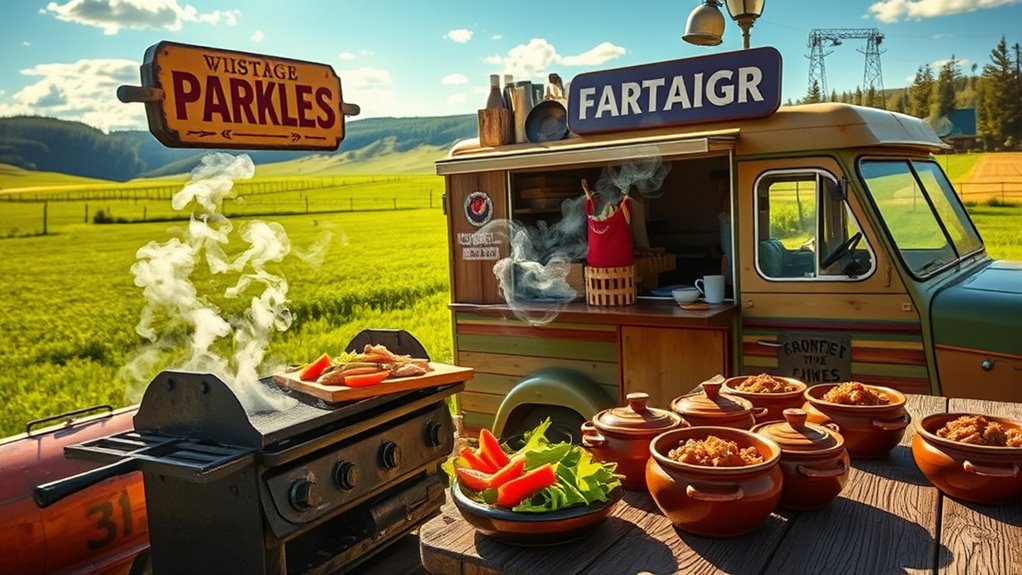
Rustic cooking techniques rely on simple tools and methods that emphasize natural flavors and traditional craftsmanship. You’ll often cook over open flames or wood fires, imparting smoky richness to meats and vegetables. Cast-iron pots and Dutch ovens allow slow roasting and simmering, extracting deep flavors from basic ingredients. Roasting meat “in its own juices” keeps the natural taste intact, while slow cooking over embers or clay stoves enhances texture and aroma. Minimal equipment like knives and simple fire setups keep the focus on authentic flavors. Marinating with fresh herbs and spices adds depth without overpowering, highlighting farm-fresh ingredients. Whole animal utilization and foraged produce reflect a sustainable, nose-to-tail approach. These techniques craft hearty, layered dishes that celebrate tradition and the land’s bounty. Cooking with natural heat sources allows for a more authentic and earthy flavor profile, connecting the cook directly to the land and season. Incorporating preservation techniques such as smoking and drying further enhances flavors while respecting traditional methods.
The Vibrant Food Truck Scene and Community Engagement
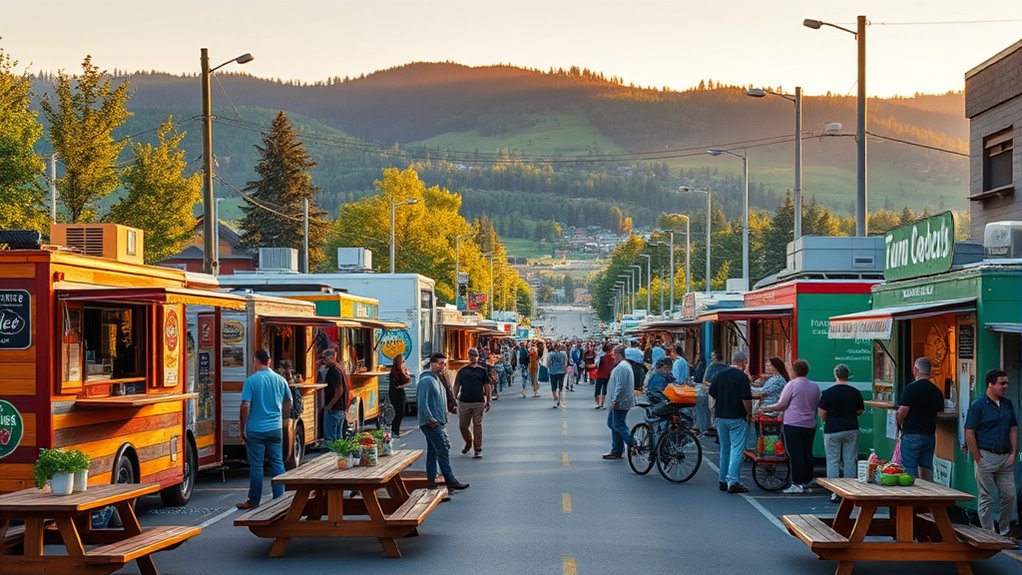
The food truck scene in Coeur d’Alene has grown dynamically, with new trucks, locations, and innovative approaches continually emerging to serve the community. You’ll find established trucks like Best Sandwich Shack with semi-permanent spots, making it easy to enjoy their offerings regularly. Many trucks partner with local breweries and distilleries, creating a vibrant, interconnected food scene. The Prairie Pavilion food truck court provides structured space, utilities, and amenities, supporting both mobile and stationary operations. These venues foster community gathering, making food trucks more than just a quick bite—they’re integral to local social life. Food trucks also actively engage with the community through private and corporate catering, festivals, and markets, boosting the local economy and strengthening the region’s hospitality culture. Additionally, the dependability of catering services in Coeur d’Alene ensures that community events and gatherings are well-supported with reliable, high-quality food options. The growth of the food truck industry in the area demonstrates a low carb friendly approach by offering diverse menu options that cater to health-conscious consumers.
Diverse Cuisines Reflecting Regional and Global Influences
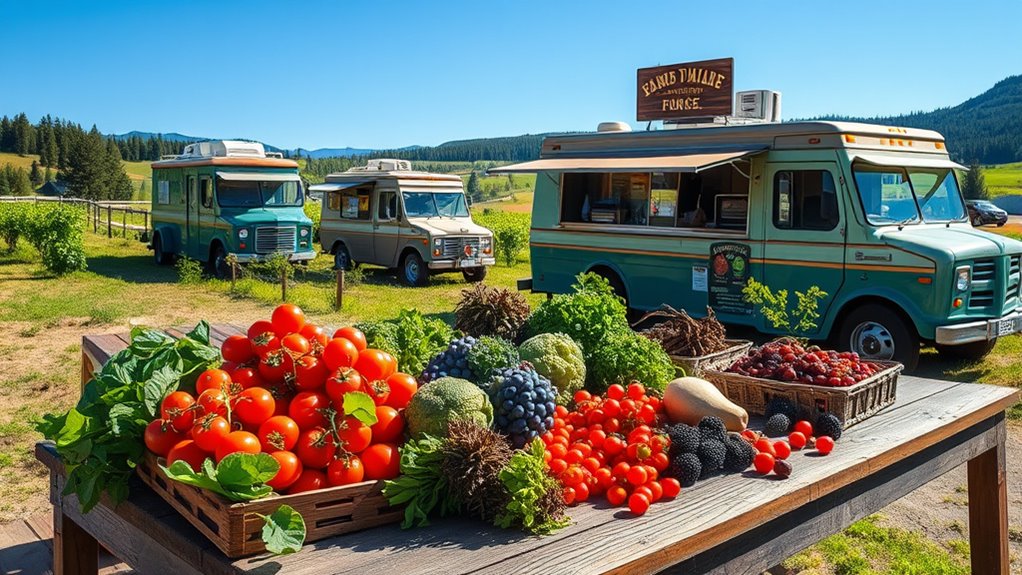
Coeur d’Alene’s food truck scene showcases a rich tapestry of global and regional flavors that reflect both local heritage and international culinary traditions. You’ll find authentic Mexican dishes like tacos and breakfast burritos from trucks such as Las Brasas and Cultura Mexican Food, packed with fresh ingredients. The diversity of offerings illustrates the variety of regional influences that shape the local food culture. Tex-Mex BBQ, like OH BABY, offers a fusion of smoky barbecue with Mexican spices. Pizza trucks serve a variety of global styles, from Neapolitan to Hawaiian, emphasizing traditional techniques with local ingredients. Northwest-influenced BBQ from Drummin Up BBQ blends southern flavors with regional twists, while burger trucks highlight local meats. Health-conscious options like smoothies and vegan dishes balance indulgence with wellness. The local food truck industry has seen significant growth, This diversity showcases Coeur d’Alene’s openness to global influences, creating a vibrant, flavorful street food scene.
Opportunities and Challenges for Food Truck Growth

Growing the food truck scene in Coeur d’Alene involves maneuvering a mix of opportunities and obstacles. On one hand, compliance with safety standards builds trust and enhances reputation, while limited competition near popular spots creates growth potential. However, strict regulations—like operating only during daylight and near schools—restrict locations and hours, reducing revenue. Licensing costs and paperwork add administrative hurdles, and maintenance requirements increase operational complexity. Permitting regulations may also require vendors to navigate complex approval processes before establishing their operations. Additionally, understanding regulatory compliance is essential for long-term success and avoiding legal issues.
Frequently Asked Questions
How Do Food Trucks Source Ingredients During Idaho’S Winter Months?
You rely on Idaho Preferred networks and local partnerships to source ingredients during winter. When fresh produce is scarce, you focus on root vegetables, hardy greens, and preserved goods like canned or frozen items. You work with regional food processors and local ranchers to get meats and dairy year-round. By adjusting your menu to feature stews, soups, and roasted dishes, you keep your farm-fresh, rustic appeal even in colder months.
What Certifications or Standards Do Local Farms Meet for Sustainable Practices?
You might think sustainable farming is hard in Idaho, but local farms prove otherwise. They meet strict standards like USDA Organic, which bans synthetic chemicals, GMOs, and emphasizes soil health. Many also pursue Real Organic Project certification, ensuring fair labor and eco-friendly practices. These farms focus on biodiversity, crop rotation, and minimal fossil fuel use, so you get fresh, responsibly grown food that supports local ecosystems and communities.
How Do Trucks Ensure Menu Consistency With Seasonal Ingredient Changes?
You guarantee menu consistency with seasonal ingredient changes by stabilizing core items while rotating in fresh, local produce. You adapt recipes slightly to match ingredient availability without losing the dish’s essence. Maintaining strong supplier relationships guarantees reliable seasonal supplies. Your staff is trained to handle substitutions, and you communicate changes clearly to customers through signage and digital updates. This approach keeps your menu fresh, consistent, and aligned with seasonal shifts.
Are There Any Specific Local Festivals Celebrating Rustic and Farm-To-Table Cuisine?
You’ll find several festivals celebrating rustic and farm-to-table cuisine in North Idaho. The North Idaho Farm Tours let you visit local farms, pick fresh produce, and enjoy farm-to-table meals. The Field to Fork Festival connects producers and community members for discussions on local food systems. Community events like Second Sundays highlight local artisans and foods, giving you a vibrant, authentic rustic food experience. These festivals showcase the region’s rich farm-to-table culture.
How Do Food Trucks Collaborate With Farmers to Develop New Menu Items?
Imagine a chef and farmer dancing in harmony, each step inspiring new flavors. You collaborate with farmers by sharing ideas, testing fresh ingredients, and experimenting with seasonal bounty. Their insights into harvest peaks help you craft innovative dishes that captivate your customers. Together, you create vibrant, farm-inspired menus, turning local produce into culinary masterpieces. This partnership fuels creativity, supports sustainability, and keeps your menu bursting with authentic, farm-fresh flair.
Conclusion
As you explore Coeur d’Alene’s vibrant food truck scene, you’ll discover a celebration of farm-fresh ingredients and rustic flavors that truly reflect the town’s heart. With diverse cuisines and a strong sense of community, it’s clear that these trucks do more than serve food—they create connections. Will you embrace the local flavors and support this thriving scene, or let opportunities for authentic, memorable experiences pass by? The choice is yours.
